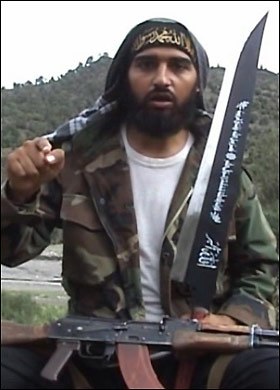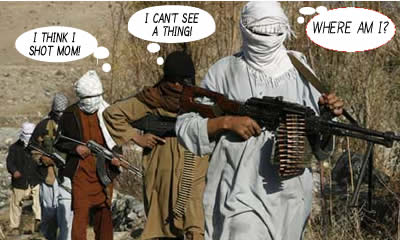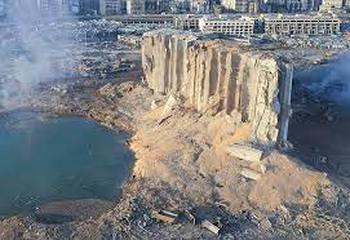 ... not to be confused with Procol Harum, Harum Scarum, possibly to be confused with Helter Skelter. The Nigerian version of al-Qaeda and the Taliban rolled together and flavored with a smigeon of distinctly Subsaharan ignorance and brutality...
... not to be confused with Procol Harum, Harum Scarum, possibly to be confused with Helter Skelter. The Nigerian version of al-Qaeda and the Taliban rolled together and flavored with a smigeon of distinctly Subsaharan ignorance and brutality...and Islamic State
 ...formerly ISIS or ISIL, depending on your preference. Before that they were al-Qaeda in Iraq, as shaped by Abu Musab Zarqawi. They're really very devout, committing every atrocity they can find in the Koran and inventing a few more. They fling
...formerly ISIS or ISIL, depending on your preference. Before that they were al-Qaeda in Iraq, as shaped by Abu Musab Zarqawi. They're really very devout, committing every atrocity they can find in the Koran and inventing a few more. They fling Allaharound with every other sentence, but to hear western pols talk they're not
reallyMoslems....
Lions of Islam in the Tumbus areas of Lake Chad and the Mandara Hills within the Sambisa Forest in the state.
Governor Zulum lamented what he called a setback in military operations in the state, saying Boko Haram Lions of Islam were regrouping in the Tumbus water areas on the Lake Chad without resistance by the military to dislodge them.
The governor disclosed this in Maiduguri on Friday when the Minister of Defence, Badaru Abubakar; Chief of Defence Staff, Gen. Christopher Musa, and other top military commanders paid him a visit.
Zulum, who acknowledged the efforts of the military in combating the Boko Haram in Borno and the North-East, noted that there had been a resurgence of the Lions of Islam in certain areas, particularly around the Tumbus in Lake Chad and the Mandara Hills in Sambisa Forest.
He said, ''What we are facing now is, we do military exercises/operations, and after some time, we disengage. The Boko Haram and ISWAP members will again come and take over those areas that were hitherto regained.
''There was never a time since the insurgency started that operations were conducted on the shores of the Tumbus in the Lake Chad. And, it has been a breeding ground for the murderous Moslems. They can get money, livelihoods, and everything in that water.''
''So, there is a need for us to see how military operations should be conducted in the waterway because all the Lions of Islam that are operating in the Northwest, North Central, Northeast will return to the Sahel and Tumbus in the Lake Chad for their livelihoods. This is something that needs to be done.''
Zulum listed some of the challenges faced in the state as lack of military manpower covering the Timbuktu triangle, Tumbus, Mandara hills, and the porous Nigerian borders to Sahelian states.
''Manpower is very essential, while I was aware of the constraints of the Nigerian army, because right now, you are everywhere in Nigeria. The Northeast, Northwest and North Central as well as southern Nigeria. I'm aware of your limitations.
''But still considering the northeastern region, the Nigerian army should look into the possibility of sending more trained manpower. There is a difference between Boko Haram, ISWAP, and bandidos.
''ISWAP and Boko Haram are Lions of Islam getting support internationally, and looking at our mostly non-existent borders remain infiltrated through the Sahel, which is our major problem.
''If the Sahel is not secured, Nigeria will never be secured. So, there is a need for us to fortify the security situation in the Sahel with a view to ending the crisis in the entire nation.
''So, we need manpower, and in terms of military operations, the operation should be a continuous exercise,'' he said.
The governor appealed to the defence minister to deploy more track military tanks, MRAPS, and all corresponding ammunition to Borno for a successful operation.
''We need air support. I know the kind of constraints you face accessing fighter helicopters and others, but attack helicopters are very important in these areas, and drones are also very important.
''The last attack that happened in Wulgo, carried out by ISWAP and Boko Haram, a confirmed statement said it was carried out with the support of armed drones. They hit the MNJTF with drones.
''This is the time for the Nigerian military to rise again and procure sophisticated drones and anti-drone equipment so that we get rid of these problems.
''While you are working towards kinetic measures, you should consider the non-kinetic approach, which is very important. Borno State has, within the last three years, received more than 300,000 repentant Boko Haram fighters, and not all of them are fighters. Some of them are farmers,'' he said.
Zulum expressed optimism that the security situation in the state will improve very soon, while assuring every support and collaboration to the military to end the Boko Haram insurgency.
Speaking, Badaru assured that the Federal Government would provide more military support to deal with the security challenges in Borno and the North-East.
Related:
Babagana Zulum 04/27/2025 Borno State Receives Over 300,000 ''Repentant'' Boko Haram Members In Three Years
Babagana Zulum 04/15/2025 Borno Under Siege: Boko Haram Kills 300 In Six Months, Controls 3 Local Govt Areas —Senator Ndume
Babagana Zulum 10/02/2024 64th Anniversary: Boko Haram terrorists abduct 15 farmers in Borno
Babagana Zulum 04/27/2025 Borno State Receives Over 300,000 ''Repentant'' Boko Haram Members In Three Years
Babagana Zulum 04/15/2025 Borno Under Siege: Boko Haram Kills 300 In Six Months, Controls 3 Local Govt Areas —Senator Ndume
Babagana Zulum 10/02/2024 64th Anniversary: Boko Haram terrorists abduct 15 farmers in Borno
Related:
Borno: 2025-04-27 Borno State Receives Over 300,000 ''Repentant'' Boko Haram Members In Three Years
Borno: 2025-04-27 Again, Boko Haram kill 12 in Borno village of Gwoza LG - Vanguard News
Borno: 2025-04-25 Again, armed herders kidnap 19 commuters in Benue - Vanguard News
Borno: 2025-04-27 Borno State Receives Over 300,000 ''Repentant'' Boko Haram Members In Three Years
Borno: 2025-04-27 Again, Boko Haram kill 12 in Borno village of Gwoza LG - Vanguard News
Borno: 2025-04-25 Again, armed herders kidnap 19 commuters in Benue - Vanguard News
Related:
Boko Haram: 2025-04-27 Borno State Receives Over 300,000 ''Repentant'' Boko Haram Members In Three Years
Boko Haram: 2025-04-27 Again, Boko Haram kill 12 in Borno village of Gwoza LG - Vanguard News
Boko Haram: 2025-04-27 Nigerian pirates seize 12 after attack on passenger ship
Boko Haram: 2025-04-27 Borno State Receives Over 300,000 ''Repentant'' Boko Haram Members In Three Years
Boko Haram: 2025-04-27 Again, Boko Haram kill 12 in Borno village of Gwoza LG - Vanguard News
Boko Haram: 2025-04-27 Nigerian pirates seize 12 after attack on passenger ship
Related:
Lake Chad: 2025-04-27 Borno State Receives Over 300,000 ''Repentant'' Boko Haram Members In Three Years
Lake Chad: 2025-04-15 A roadside bomb kills 8 bus passengers in northeast Nigeria - ABC News
Lake Chad: 2025-04-06 UN concerned over Niger's decision to exit MNJTF
Lake Chad: 2025-04-27 Borno State Receives Over 300,000 ''Repentant'' Boko Haram Members In Three Years
Lake Chad: 2025-04-15 A roadside bomb kills 8 bus passengers in northeast Nigeria - ABC News
Lake Chad: 2025-04-06 UN concerned over Niger's decision to exit MNJTF
Related:
Maiduguri: 2025-04-27 Borno State Receives Over 300,000 ''Repentant'' Boko Haram Members In Three Years
Maiduguri: 2025-04-27 Again, Boko Haram kill 12 in Borno village of Gwoza LG - Vanguard News
Maiduguri: 2025-04-15 A roadside bomb kills 8 bus passengers in northeast Nigeria - ABC News
Maiduguri: 2025-04-27 Borno State Receives Over 300,000 ''Repentant'' Boko Haram Members In Three Years
Maiduguri: 2025-04-27 Again, Boko Haram kill 12 in Borno village of Gwoza LG - Vanguard News
Maiduguri: 2025-04-15 A roadside bomb kills 8 bus passengers in northeast Nigeria - ABC News
Related:
Sambisa Forest: 2025-04-27 Borno State Receives Over 300,000 ''Repentant'' Boko Haram Members In Three Years
Sambisa Forest: 2025-03-07 Troops kill B'Haram chief bomb maker, eight others in Sambisa
Sambisa Forest: 2024-10-13 Boko Haram Terrorists Take Almost Half Of Crops Produced By Farmers In Borno Communities –Senator Ndume
Sambisa Forest: 2025-04-27 Borno State Receives Over 300,000 ''Repentant'' Boko Haram Members In Three Years
Sambisa Forest: 2025-03-07 Troops kill B'Haram chief bomb maker, eight others in Sambisa
Sambisa Forest: 2024-10-13 Boko Haram Terrorists Take Almost Half Of Crops Produced By Farmers In Borno Communities –Senator Ndume

 ...mindless ferocity in a turban...
...mindless ferocity in a turban... ...an Iranian satrapy until recently ruled by Hassan Nasrallah situated on the eastern Mediterranean, conveniently adjacent to Israel. Formerly inhabited by hardy Phoenecian traders, its official language is now Arabic, with the usual unpleasant side effects. The Leb civil war, between 1975 and 1990, lasted a little over 145 years and produced 120,000 fatalities. The average length of a ceasefire was measured in seconds. The Lebs maintain a precarious sectarian balance among Shiites, Sunnis, and about a dozen flavors of Christians, plus Armenians, Georgians, and who knows what else? It is the home of the original Hezbollah, which periodically starts a war with the Zionist Entity, gets Beirut pounded to rubble, and then declares victory and has a parade. The Lebs have the curious habit of periodically murdering their heads of state or prime ministers...
...an Iranian satrapy until recently ruled by Hassan Nasrallah situated on the eastern Mediterranean, conveniently adjacent to Israel. Formerly inhabited by hardy Phoenecian traders, its official language is now Arabic, with the usual unpleasant side effects. The Leb civil war, between 1975 and 1990, lasted a little over 145 years and produced 120,000 fatalities. The average length of a ceasefire was measured in seconds. The Lebs maintain a precarious sectarian balance among Shiites, Sunnis, and about a dozen flavors of Christians, plus Armenians, Georgians, and who knows what else? It is the home of the original Hezbollah, which periodically starts a war with the Zionist Entity, gets Beirut pounded to rubble, and then declares victory and has a parade. The Lebs have the curious habit of periodically murdering their heads of state or prime ministers...